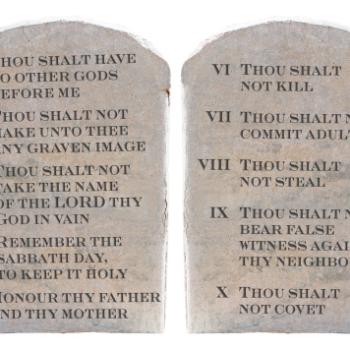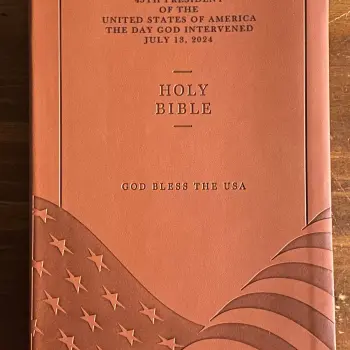Some texts in the New Testament claim that Moses in the Old Testament predicted the sufferings of Jesus of Nazareth. But many Bible readers claim no such text or texts exist. They are right that there is no clear and obvious prophesy about this. But God has other ways of predicting the future, and they can be quite cryptic and thus mysterious. This is very important when considering the surprising fact that Jews generally reject Jesus as their Messiah. Why is that?
God’s Promised Messiah for Israel
By the time of Jesus, a strong belief had arisen among Jews that God would send Israel a Messiah, meaning “anointed one” (John 7.26, 31; Acts 3.18, 36). They believed he would deliver their nation from its enemies and make it the center of God’s worldwide kingdom of peace. And they supported this belief by citing scriptures, primarily three that foretell about this militant Messiah: Genesis 49.10, Numbers 24.7-8, 17, and Isaiah 11.1-4.
Likewise, Jews generally did not believe this God-appointed Messiah would suffer and be killed, as Jesus was. That is the main reason for the most profound phenomena in the history of religion: this Jesus, the most famous man in all of history—who never held a political, military, or religious office, never wrote a book, never hardly travelled outside Israel, and died at only about 33 years of age—“came to what was his own, and his own people did not accept him” (John 1.12). Many Jews ever since have regarded Jesus as “an imposter” who “practiced sorcery and enticed Israel to apostasy” (Sanhedrin 43).
Yet 2,000 years later, one third of the world’s population calls itself “Christian” by believing this Jesus the Nazarene was God’s promised Messiah, which is Christ. So, Christianity, which consists almost entirely of non-Jews, has been the world’s largest religion for the past sixteen centuries. Why is that? For one thing, Christians believe that some of the Jewish scriptures—especially Isaiah 53, which is about a righteous servant of Yahweh, the name of Israel’s God—foretells most vividly Jesus’ sufferings, death, and resurrection. Plus, the early, leading disciples of Jesus cited Psalm 16.10 as a prediction of his death and resurrection (Acts 2.37, 31; 13.35). But they never support this with texts from Moses.
Thus, for Christians, two of the three divisions of the Tanach (the Jewish scriptures)—the Prophets and the Writings—predict Jesus’ sufferings, death, and resurrection. But what about the law of Moses, the Torah, that other division of the Tanach attributed to Moses authorship? It generally is regarded as the first five books of the Jewish Bible, called the Pentateuch. Did Moses predict anywhere in this portion of scripture that God’s promised Messiah would suffer and die? Jesus and his leading disciples seemed to think so.
Jesus Said Moses Predicted his Sufferings & Death
According to the Gospel of Luke in the New Testament, on Jesus’ day of resurrection he appeared to two of his disciples and said to them, “Oh, how foolish you are, and how slow of heart to believe all that the prophets have declared” (Luke 24.25). He surely included Moses, the greatest prophet of all. Jesus added, “Was it not necessary that the Messiah should suffer?” (v. 26). Luke next relates, “Then beginning with Moses and all the prophets, he interpreted to them the things about himself in all the scriptures” (v. 27). Unfortunately, Luke does not cite any biblical text attributed to Moses that says Messiah would suffer.
Luke further relates that those two disciples joined the gathered disciples Easter evening in Jerusalem where the risen Jesus appeared to them as well (Luke 24.33-36). And he said to them, “These are my words that I spoke to you while I was still with you—that everything written about me in the law of Moses, the prophets, and the psalms must be fulfilled” (Luke 24.44). Luke continues, “Then he opened their minds to understand the scriptures, and he said to them, ‘Thus it is written, that the Messiah is to suffer and to rise from the dead on the third day’” (v. 46). This seems to mean that the law of Moses predicts Jesus’ sufferings, death, and resurrection.
Yet, many Bible readers claim Moses only prophesied about Jesus once in scripture, in which he said to Israel, “The LORD your God will raise up for you a prophet like me from among your own people; you shall heed such a prophet. … I will put my words in the mouth of the prophet, … Anyone who does not heed the words that the prophet shall speak in my name, I myself will hold accountable” (Deuteronomy 18.15, 18-19).
Jesus’ Disciples Said So Too
And it was no different with Jesus’ disciples; they believed that Moses predicted Jesus’ sufferings so that Jews were wrong in thinking the Messiah would not suffer. For example, soon after what scholars call the Christ event (the life, death, resurrection, and heavenly ascension of Jesus), the apostle Peter proclaimed to thousands of Jews gathered at the temple in Jerusalem on the Day of Pentecost, “God fulfilled what he had foretold through all the prophets,” which must include Moses, “that his Messiah would suffer” (Acts 3.18).
Later, at Thessalonica, Greece, the apostle “Paul went in [to the synagogue], as was his custom, and on three sabbath days argued with them from the scriptures, explaining and proving that it was necessary for the Messiah to suffer and to rise from the dead, and saying, ‘This is the Messiah, Jesus whom I am proclaiming to you’” (Acts 17.2-3). Paul does not here mention Moses, but he may have meant to include Torah in “the scriptures” since the Sadducees only regarded Torah as fully inspired by God.
And later, Paul proclaimed to King Agrippa, “I stand here, testifying to both small and great, saying nothing but what the prophets and Moses said would take place: that the Messiah must suffer,” which must include death since Paul then added, “by being the first to rise from the dead” (Acts 26.22-23).
Were Jesus & His Disciples Wrong About It?
But none of these above scriptures inform where in Torah did Moses predict the sufferings of the Messiah, let alone his death and resurrection. Many Bible readers have been puzzled by the fact that nowhere in the Pentateuch does Moses clearly and explicitly predict, as in a straightforward prophesy, the sufferings of the Messiah. This has caused not of few biblical scholars to conclude that Moses did not do so. But this suggests that Jesus and his disciples were misguided or just plain wrong.
For example, Joseph A. Fitzmyer, in his Anchor Bible commentary on Acts (p. 287), says of Peter’s speech in Acts 3.18, quoted above, “Luke implies that the OT spoke of a ‘suffering Messiah.’ Such a notion, however, is not found in the Hebrew Scriptures; in fact, in the NT the idea is found exclusively in Lucan writings: Luke 24:26, 46; Acts 17:3; 26:23.” (Fitzmyer is being ultra-specific by distinguishing between Messiah and Isaiah’s suffering servant in Isaiah 53. See his commentary on Luke, p. 200).
In considering prediction about the future in the Bible, it would be a mistake to limit this material only to clear, straightforward prophesy. For, Moses predicts the sufferings, death, and resurrection of the Messiah cryptically, thus obscurely, by means of both type and ritual.
Akedah Predicts Jesus’ Death & Resurrection
I wrote a book, The Third Day Bible Code, that is about types in the Bible which forecast Jesus’ death and resurrection on the third day. Chapter Twelve in this book is entitled, “Abraham’s Offering of Isaac on the Third Day.” I explain (p. 34), “a type is a person, object, historical event, or institution that represents, symbolizes, or prefigures something else, often of like nature, that usually happens in the future, called an ‘antitype.’ So, a type is often regarded as a symbol, emblem, token, or sign.”
One example of a type in my book that forecasts Jesus’ death and resurrection is Chapter Eight, “The Sign of Jonah the Prophet.” Matthew says of Jesus, “Then some of the scribes and Pharisees said to him, ‘Teacher, we wish to see a sign from you.’ But he answered them, ‘An evil and adulterous generation asks for a sign, but no sign will be given to it except the sign of the prophet Jonah. For just as Jonah was three days and three nights in the belly of the sea monster, so for three days and three nights the Son of Man will be in the heart of the earth’” (Matthew 12.38-40; cf. 16.4). As I said, a sign is a type, and scholars inform that this method of forecasting the future is peculiar to the Judeo-Christian faith.
Another such chapter in my book is entitled, “Abraham’s Offering of Isaac on the Third Day.” It is the precious, yet troubling, story in Genesis 22 which Jews call the akedah, meaning “binding” of Isaac. They regard it as one of the most theologically important events in the history of their people. This true story, attributed to Moses, begins, “God tested Abraham. He said to him, ‘Abraham!’ And he said, ‘Here I am.’ He said, ‘Take your son, your only son Isaac [by Sarah his wife], whom you love, and go to the land of Moriah, and offer him there as a burnt offering on one of the mountains that I shall show you’” (Genesis 22.1-2).
Abraham went there, made an altar, bound Isaac, laid him on the wood on the altar, and took his knife to slay him (Genesis 22.3-10). But God’s angel stopped him, saying, “Do not lay your hand on the boy or do anything to him; for now I know that you fear God, since you have not withheld your son, your only son, from me.’ And Abraham looked up and saw a ram, caught in a thicket by its horns. Abraham went and took the ram and offered it up as a burnt offering instead of his son. So Abraham called that place ‘The LORD will provide;’ as it is said to this day, ‘On the mount of the LORD it shall be provided’ (vv. 12-14). It seems that place is where the Israelites later built their temple at Jerusalem (2 Chronicles 3.2).
The New Testament book of Hebrews affirms this story in saying, “By faith, Abraham, when put to the test, offered up Isaac;” yet God had promised to make Abraham’s “descendants” through Isaac a great nation (Hebrews 11.17-18). Isaac likely was a teenager and therefore had not yet had children as descendants. Thus, the author adds, “He considered the fact that God is able even to raise someone from the dead—and figuratively speaking, he did receive him back” (v. 19). So, according to the Christian viewpoint of this event, like Jonah in the belly of the fish, it is a type that cryptically forecasts Jesus’ death and resurrection.
Goat on Yom Kippur Symbolizes Jesus’ Death
But the most graphic forecasting of Jesus’ death in the biblical writings of Moses is the most important ritual that ancient Israel used to observe. Yom Kippur, which means “Day of Atonement,” is still the most important day of the year observed by religious Jews. But they cannot celebrate it in its full extent since it must involve animal sacrifice. Moses had instructed, in Leviticus 16, that Jews were to fast all day and gather to observe a priest standing before the altar with two goats. One was labeled in Hebrew la-yhwh, meaning “for Yahweh,” and the other was labeled la-azazel, meaning “for Azazel.” The priest laid his hand on both goats to signify sins being transferred to them. The priest then sacrificed the goat for Yahweh, but he let the goat for Azazel go free into the Judean wilderness.
There has been much discussion about the meaning of these two symbolic acts. Christians, rightly I think, have interpreted the sacrificed goat for Yahweh as a symbol of Jesus’ death, so that Moses therein, being guided by God, foretold the sufferings and death of Israel’s Messiah. (As for the meaning of the goat for Azazel, see Chapter Six, “The Scapegoat,” in my book Warrior from Heaven.”)
In conclusion, Moses, I believe, did project the death of Jesus in the Yom Kippur ritual and both the death and resurrection of Jesus in the type called akedah.














